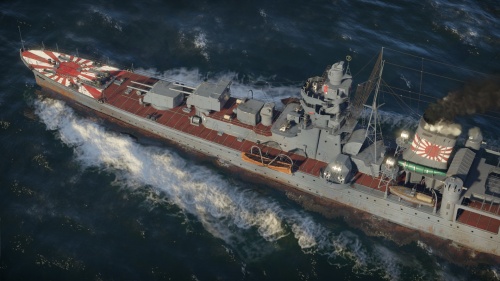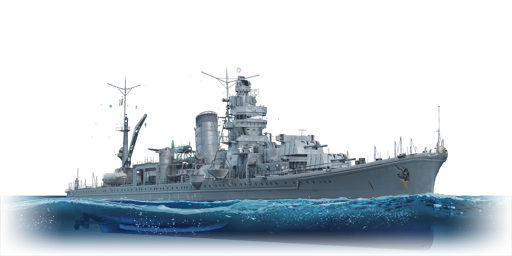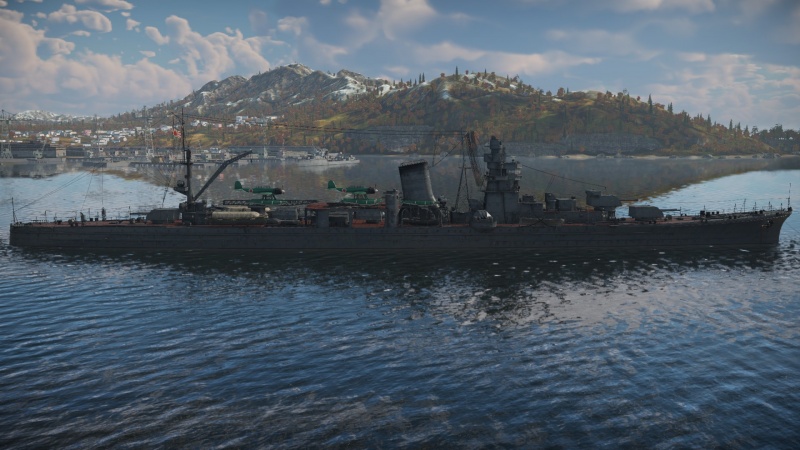IJN Agano
Contents
Description
The Agano-class, IJN Agano, 1944 (阿賀野, namesake: Agano River) is a rank IV Japanese light cruiser with a battle rating of 5.3 (AB/RB/SB). It was introduced in Update 1.89 "Imperial Navy".
General info
Survivability and armour
Talk about the vehicle's armour. Note the most well-defended and most vulnerable zones, e.g. the ammo magazine. Evaluate the composition of components and assemblies responsible for movement and manoeuvrability. Evaluate the survivability of the primary and secondary armaments separately. Don't forget to mention the size of the crew, which plays an important role in fleet mechanics. Save tips on preserving survivability for the "Usage in battles" section. If necessary, use a graphical template to show the most well-protected or most vulnerable points in the armour.
Mobility
Write about the ship's mobility. Evaluate its power and manoeuvrability, rudder rerouting speed, stopping speed at full tilt, with its maximum forward and reverse speed.
| Mobility Characteristics | |||
|---|---|---|---|
| Game Mode | Upgrade Status | Maximum Speed (km/h) | |
| Forward | Reverse | ||
| AB | |||
| Upgraded | 76 | 23 | |
| RB/SB | |||
| Upgraded | 65 | 20 | |
Modifications and economy
Armament
Primary armament
Provide information about the characteristics of the primary armament. Evaluate their efficacy in battle based on their reload speed, ballistics and the capacity of their shells. Add a link to the main article about the weapon: {{main|Weapon name (calibre)}}. Broadly describe the ammunition available for the primary armament, and provide recommendations on how to use it and which ammunition to choose.
| Penetration statistics | |||||||
|---|---|---|---|---|---|---|---|
| Ammunition | Type of warhead |
Penetration @ 0° Angle of Attack (mm) | |||||
| 1,000 m | 2,500 m | 5,000 m | 7,500 m | 10,000 m | 15,000 m | ||
| Type 0 HE | HE | 35 | 35 | 35 | 35 | 35 | 35 |
| Type 4 SAP | SAP | 81 | 68 | 52 | 40 | 34 | 34 |
| Type 0 HE-TF | HE-TF | 35 | 35 | 35 | 35 | 35 | 35 |
| Shell details | |||||||||
|---|---|---|---|---|---|---|---|---|---|
| Ammunition | Type of warhead |
Velocity (m/s) |
Projectile Mass (kg) |
Fuse delay (m) |
Fuse sensitivity (mm) |
Explosive Mass (TNT equivalent) (g) |
Ricochet | ||
| 0% | 50% | 100% | |||||||
| Type 0 HE | HE | 850 | 45.26 | 0 | 0.1 | 3,170 | 79° | 80° | 81° |
| Type 4 SAP | SAP | 850 | 45.26 | 8 | 7 | 2,920 | 47° | 60° | 65° |
| Type 0 HE-TF | HE-TF | 850 | 45.26 | 0 | 0.1 | 3,170 | 79° | 80° | 81° |
Secondary armament
Some ships are fitted with weapons of various calibres. Secondary armaments are defined as weapons chosen with the control Select secondary weapon. Evaluate the secondary armaments and give advice on how to use them. Describe the ammunition available for the secondary armament. Provide recommendations on how to use them and which ammunition to choose. Remember that any anti-air armament, even heavy calibre weapons, belong in the next section. If there is no secondary armament, remove this section.
Anti-aircraft armament
An important part of the ship's armament responsible for air defence. Anti-aircraft armament is defined by the weapon chosen with the control Select anti-aircraft weapons. Talk about the ship's anti-air cannons and machine guns, the number of guns and their positions, their effective range, and about their overall effectiveness – including against surface targets. If there are no anti-aircraft armaments, remove this section.
Additional armament
Describe the available additional armaments of the ship: depth charges, mines, torpedoes. Talk about their positions, available ammunition and launch features such as dead zones of torpedoes. If there is no additional armament, remove this section.
Scout plane
Located amidships is a catapult with one Aichi E13A1 scout plane (the second stored on the trolley is not available) which provides unique offensive and defensive abilities, expanding tactical options. Ship-launched scout planes fly just like regular tree units but lack munition choices and cockpit views. The E13A1 is equipped with a 7.7 mm Type 97 defensive machine gun and a formidable load of 4 x 60 kg bombs. It also has the scout plane ability to cap zones and lay down smoke cover (up to 3 times). Captains will be wise to remember to utilize the aircraft and consider when best to use it, for example to cap a point early or late in the match, to create a smoke screen to stymie enemy bombardment and repair, to attack enemy units directly, or perhaps something completely new! Carrying a heavier bomb load than most other scout planes, this unit has a very good chance to sink enemy boats or even a destroyer.
Usage in battles
Describe the technique of using this ship, the characteristics of her use in a team and tips on strategy. Abstain from writing an entire guide – don't try to provide a single point of view, but give the reader food for thought. Talk about the most dangerous opponents for this vehicle and provide recommendations on fighting them. If necessary, note the specifics of playing with this vehicle in various modes (AB, RB, SB).
Pros and cons
Pros:
- 16 Long Lance torpedoes are devastating against enemy ships
- Very fast for a cruiser, can keep up with some destroyers when fully upgraded
- Main guns have a great rate of fire in first-stage, equal to US cruisers
- One scout plane.
Cons:
- 25 mm AA guns cannot engage close targets
- Torpedoes have very limited firing arc
- Armour is mediocre, other cruisers will punch right through it at close range
- Turrets are large and lack armour, can thus easily be disabled
History
Agano was the lead ship of four light cruisers built to supercede and replace the older cruisers serving as destroyer flotilla flagships in the Imperial Japanese Navy. Launched in October 1941, she entered service a year later and saw her first operation escorting troop transports to New Guinea in December 1942. The ship was involved in Operation Ke, the evacuation of 10,652 Japanese troops from Guadalcanal as well as the Battle of Empress Augusta Bay, an American victory which closed the Solomon Islands campaign. Several weeks later, American airstrikes damaged the ship as it lay in port at Rabaul and whilst en route to receive repairs, she was struck by a torpedo from an American submarine which flooded the boiler rooms and knocked out all power. The submarine Albacore prepared to finish the helpless and immobile ship, but was prevented from doing so by depth charges from the Urakaze. Taken under tow to Truk, Agano underwent 4 months of repairs before being able to attempt the journey back to the home islands of Japan in February 1944, for more permanent fixes. Ambushed by the American submarine Skate, Agano was hit by 2 torpedoes and sank 6 hours later.
Her destroyer escort Oite took on 523 survivors from the Agano, but was herself sunk 2 days later by Grumman TBF Avengers of Task Force 58 during Operation Hailstone. She sank almost immediately with the loss 172 out of her 192 complement whilst all 523 survivors of the Agano were lost.
Media
- Skins

See also
Links to articles on the War Thunder Wiki that you think will be useful for the reader, for example:
- reference to the series of the ship;
- links to approximate analogues of other nations and research trees.
External links
Paste links to sources and external resources, such as:
- topic on the official game forum;
- other literature.
| Sasebo Naval Arsenal (佐世保海軍工廠) | |
|---|---|
| Destroyers | |
| Mutsuki-class | IJN Mutsuki |
| Hatsuharu-class | IJN Hatsuharu |
| Shiratsuyu-class | IJN Yuudachi |
| Light Cruisers | |
| Agano-class | IJN Agano |
| Unique Ships | IJN Yubari |
| Tanks | Chi-Ha Short Gun |
| Japan light cruisers | |
|---|---|
| Kuma-class | IJN Tama |
| IJN Yubari* | |
| Nagara-class | IJN Isuzu |
| Sendai-class | IJN Sendai |
| Agano-class | IJN Agano |
| Mogami-class | IJN Mikuma · IJN Suzuya |
| * Unique ship | |





